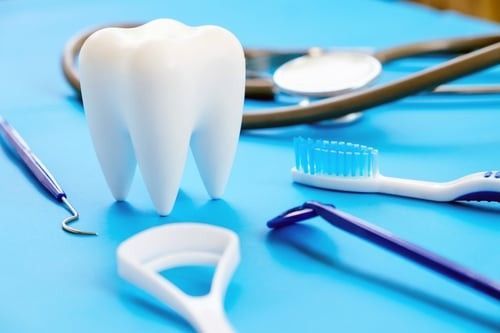What Does Your Tooth Pain Mean?
Contrary to popular belief, your teeth are not made of bone. They're actually made of four different types of tissue. In the center of your tooth is the pulp, which is composed of nerves and blood vessels. Getting a toothache means the pulp has been damaged or decayed, exposing the nerves.
A toothache isn't just an inconvenience that you can treat with aspirin—it's a warning sign that lets you know that you need to get to the dentist before the infection worsens.
Here's a look at some of the most common toothaches and what they could mean.
Tooth Pain #1: Short-Lived Tooth Sensitivity
Everyone knows someone who has sensitive teeth. Perhaps you are that person.
If you take a bite out of an ice cream cone or a bubbling hot slice of pizza, your teeth "shudder" from the extreme temperature. Some people are also sensitive to certain tastes, like sweet or acidic foods. Your sensitive teeth might be a result of eroded enamel, which exposes the nerves underneath.
Tooth Pain #2: Long-Term Tooth Sensitivity
Short-term sensitivity is usually easy to treat, but long-term sensitivity could be an indication of something more severe. You may have long-term sensitivity if it hurts for several minutes after eating certain foods. This is caused by severe tooth damage or decay that reaches the sensitive pulp inside of your tooth. If this has happened, you should see your dentist as soon as possible. They may be able to treat the issue before it gets worse.
Tooth Pain #3: Sharp Tooth Pain
In contrast to sensitivity, you might experience sharp pain every time you eat. Over time, you might feel your jaw throbbing as a result of the pain. If you're experiencing sharp, localized pain, you’re likely dealing with a cracked or broken tooth. Leaving a cavity untreated will only make it worse—and if you wait long enough after you notice it, the dentist may have to remove it altogether. Even a small cavity could lead to tooth decay if you don't treat it.
Tooth Pain #4: Jaw Pain
Jaw pain may indicate an abscess or an infection. If it is not treated, you might experience a fever, increasing pain, or swelling in the neck and jaw. The infection could spread to other nearby areas such as your jaw and throat. If you're experiencing jaw pain, make an appointment with your dentist right away—the pain isn't going away on its own.
If you're looking for a dentist in the Clarksville area, contact Patriot Family Dental to set up an appointment. We offer routine cleanings, root canals, fillings, extractions, and other procedures, as well as dentures, veneers, and orthodontics.
Have more questions about tooth pain? Check our blog regularly for updated content and new information.
The post What Does Your Tooth Pain Mean? appeared first on Patriot Family Dental.












